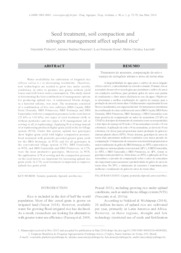Seed treatment, soil compaction and nitrogen management affect upland rice.
Seed treatment, soil compaction and nitrogen management affect upland rice.
Author(s): PINHEIRO, V.; NASCENTE, A. S.; STONE, L. F.; LACERDA, M. C.
Summary: Water availability for cultivation of irrigated rice (Oryza sativa L.) is decreasing worldwide. Therefore, new technologies are needed to grow rice under aerobic conditions, in order to produce rice grains without yield losses and with lower water consumption. This study aimed at determining the best combination of management options for producing upland rice. A randomized blocks design, in a factorial scheme, was used. The treatments consisted of a combination of five rice cultivars (BRS Caçula, BRS Serra Dourada, BRS Primavera, BRS Sertaneja and BRS Esmeralda) with two compaction pressures in the seed furrow (25 kPa or 126 kPa), two types of seed treatment (with or without pesticide) and two types of N management (all at sowing or all at topdressing). Applying N at sowing instead of at topdressing produced higher grain yield in the no-tillage system (NTS). Under this system, upland rice genotypes show higher grain yield with higher compaction pressure. Seed treatment with pesticide provided greater grain yield for the BRS Sertaneja, in NTS, and for all genotypes in the conventional tillage system (CTS). BRS Esmeralda, in NTS, and BRS Esmeralda and BRS Primavera, in CTS, were the most productive genotypes. Moreover, in NTS, the application of N at sowing and the compaction pressure on the seed furrow are important for increasing upland rice grain yield. In CTS, seed treatment is important to improve upland rice grain yield.
Publication year: 2016
Types of publication: Journal article
Unit: Embrapa Rice & Beans
Keywords: Arroz, Arroz aeróbico, Compactação do solo, Cupim, Nitrogênio, Oryza sativa, Pesticida, Tratamento de semente, fipronil
Observation
Some of Embrapa's publications are published as ePub files. To read them, use or download one of the following free software options to your computer or mobile device. Android: Google Play Books; IOS: iBooks; Windows and Linux: Calibre.
Access other publications
Access the Agricultural Research Database (BDPA) to consult Embrapa's full library collection and records.
Visit Embrapa Bookstore to purchase books and other publications sold by Embrapa.

